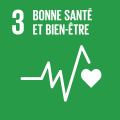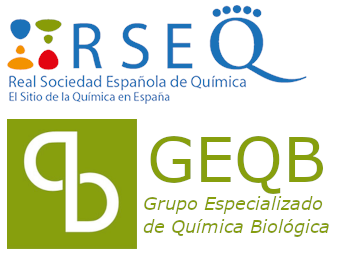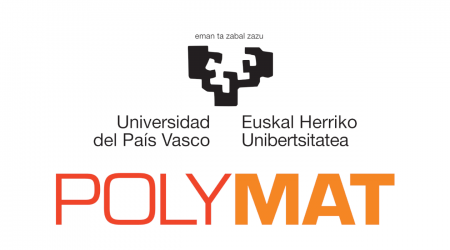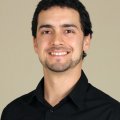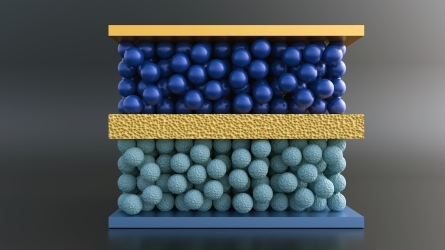
ChemBioVIII - Reunión Bienal GEQB-RSEQ
Reunión bianual del grupo especializado de Química Biológica de la RSEQ. La reunión engloba especialistas en diferentes áreas de la química, biología y bioquímica, focalizándose en el desarrollo de herramientas químicas para resolver problemas biológicos.
Descripción
San Sebastián (España) acogerá la VIII Reunión Bienal del Grupo Especializado de Química Biológica de la Real Sociedad Española de Química (ChemBioVIII – GEQB RSEQ) del 27 al 29 de abril de 2026, en el Aquarium de Donostia–San Sebastián.
El congreso reunirá a investigadoras e investigadores que trabajan en la interfaz entre la química y la biología, ofreciendo un espacio para discutir avances científicos recientes, promover la colaboración interdisciplinar e intercambiar conocimiento en un entorno dinámico e inclusivo. El programa científico se organizará en cinco sesiones temáticas que abarcan áreas de alta relevancia en el campo:
- Biología estructural y computacional
- Nanobiotecnología y herramientas químicas en biología
- Biocatálisis, química enzimática y glicobiología
- Química médica y terapias
- Biología sintética y biomateriales
El formato incluirá conferencias plenarias e invitadas, 20 comunicaciones orales seleccionadas, presentaciones flash y dos sesiones de póster abiertas a participantes de todas las etapas de la carrera científica.
PONENTES CONFIRMADOS
Ponentes plenarios
- Isabella Felli (CERM, Italia)
- Andreas Walther (Max Planck Institute Mainz, Alemania)
- Daniel Bojar (University of Gothenburg, Suecia)
- María del Puerto Morales (ICMM-CSIC, España)
- Marc Güell (Universitat Pompeu Fabra, España)
Ponentes invitados
- Gonzalo Jiménez-Osés (CIC bioGUNE, España)
- Marcelo Calderón (POLYMAT – UPV/EHU, España)
- María-Luisa Romero-Romero (IQAC-CSIC, España)
- June Ereño (CIC bioGUNE, España)
- Fernando López-Gallego (CIC biomaGUNE, España)
- Vanesa Fernández-Moreira (ISQCH-CSIC / UNIZAR, España)
- Carlos Romero-Nieto (UCLM, España)
- Silvia Hernández-Ainsa (INMA-CSIC, España)
- Gianni Ciofani (iit, Italia)
- Paula Navarro (University of Lausanne, Switzerland)
Además de las conferencias plenarias y ponencias invitadas, ChemBioVIII contará con dos sesiones de póster, 20 comunicaciones orales seleccionadas, sesiones de presentaciones flash y una cena de gala (opcional), diseñadas para promover la participación de investigadoras e investigadores en todas las etapas profesionales y fomentar el intercambio científico en un ambiente colaborativo y cercano.
ENVÍO DE ABSTRACTS
- Envío de resúmenes: del 01 de diciembre de 2025 al 28 de febrero de 2026.
- La comunicación de la aceptación/denegación de resúmenes se hará antes del 7 de marzo de 2026.
Se solicita a las personas autoras que utilicen la PLANTILLA oficial para la preparación del resumen y envíen su propuesta desde una cuenta Gmail, a través de este FORMULARIO.
Los resúmenes enviados podrán ser seleccionados para 20 presentaciones orales seleccionadas, flash talks o sesiones de póster.
El congreso concederá 12 becas de inscripción exclusivamente para miembros estudiantiles del GEQB. Las personas interesadas que aún no sean miembros y deseen optar a una beca o beneficiarse de tarifas reducidas pueden darse de alta en: https://geqb.rseq.org/
ORGANIZADORES
- Ana Beloqui Elizazu (POLYMAT – EHU)
- Natalia Baranova (CIC biomaGUNE)
- Ganeko Bernardo Seisdedos (Universidad de Deusto)
EVENTO SATÉLITE
El congreso contará con un evento satélite organizado y patrocinado por el European Doctoral Network TheraTools: Innovative tools to treat and model complex cancer environments. Este proyecto europeo se centra en el desarrollo de nuevos sistemas de liberación de fármacos y modelos in vitro avanzados para abordar los retos del glioblastoma, incluyendo herramientas basadas en polímeros y biomateriales, nuevas estrategias terapéuticas, investigación de la barrera hematoencefálica (BBB) y modelos de BBB y glioblastoma mediante microfluidos y bioimpresión 3D.
Este evento forma parte de la serie de conferencias de TheraTools y ofrece un punto de encuentro para compartir resultados recientes, explorar colaboraciones y conectar con especialistas líderes en el desarrollo de herramientas biomédicas innovadoras.
Investigadoras e investigadores invitados: por confirmar
Horario: 29 de abril de 2026, de 15:00 a 19:00 h
Más información: https://theratools.eu
INFORMACIÓN Y ENLACES OFICIALES
- Web oficial del congreso (información y actualizaciones): www.chembio2026.com
- Registro e inscripción gestionados a través de la plataforma UIK.
- Perfil oficial en LinkedIn: www.linkedin.com/company/chembioviii
ChemBioVIII tiene como objetivo reforzar la colaboración entre disciplinas y poner en valor la investigación innovadora en química biológica, promoviendo un ambiente científico abierto, respetuoso y colaborativo.
Objetivos
Favorecer el intercambio de conocimiento entre investigadores/as que trabajan en la interfaz de la química y la biología.
Presentar los avances más recientes en áreas clave de la química biológica: biología estructural y computacional, nanobiotecnología y biocatálisis, química médica, biología sintética y biomateriales.
Promover la participación activa de jóvenes investigadores/as mediante presentaciones orales y sesiones de póster.
Estimular la creación de nuevas colaboraciones científicas entre grupos de investigación, tanto consolidados como emergentes.
Facilitar el contacto entre el ámbito académico y el sector industrial a través de sesiones específicas con patrocinadores.
Reforzar la cohesión de la comunidad científica nacional en química biológica.
Público objetivo al que está dirigida la actividad
- Alumnado universitario
- Profesorado
- Profesionales
Metodología
La metodología se basa en ponencias magistrales y presentaciones científicas distribuidas en sesiones temáticas, seguidas de tiempo para debate y preguntas abiertas. Las conferencias plenarias tendrán una duración de 50 minutos + 10 minutos de preguntas, las ponencias invitadas 25 minutos + 5 minutos de discusión, y las comunicaciones orales seleccionadas 12 minutos + 3 minutos para preguntas.
Además, se promoverá la interacción entre participantes mediante sesiones de pósteres, flash talks, actividades de networking y espacios informales de discusión. Se fomentará especialmente la participación activa del alumnado predoctoral, incluyendo la concesión de premios a comunicaciones destacadas y la organización de sesiones específicas para jóvenes investigadores.
Directoras/es

Ana Beloqui Elizazu
UPV/EHU
Dr. Ana Beloqui is a multidisciplinary researcher whose work spans chemistry, enzymology, nanotechnology, and applied polymer chemistry. She leads the PolyZymes Lab at POLYMAT Institute (Spain), where she has pioneered a research line focused on combining proteins and polymers to create advanced functional materials. These hybrids are meticulously designed to enhance the stability of functional proteins and expand their use in applications such as sensing, therapeutics, and bioremediation. Her contributions to the field have been recognized with the "Best Young Group Leader" award by the Group of Chemical Biology of the Spanish Royal Chemical Society.
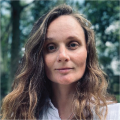
Natalia Baranova
CICBiomaGUNE
Natalia Baranova obtained her PhD from the University of the Basque Country under the supervision of Prof. Ralf Richter, working at the interface of biophysics and membrane-associated processes. She then joined the Institute of Science and Technology Austria in the group of Prof. Martin Loose, where her postdoctoral research was supported by long-term EMBO and HFSP fellowships. Afterwards, she continued her career at the University of Vienna with Prof. Christoph Rademacher, receiving a Marie Jahoda Professorship Transition grant to begin her independent research. Throughout her training, she has worked in laboratories supported by ERC funding and developed expertise in advanced microscopy, molecular engineering and synthetic biology. Natalia is now establishing her group at CIC biomaGUNE, supported by Ramón y Cajal and Ikerbasque Fellow grants. She has published in high-impact journals and secured national and EU funding. Her research focuses on reverse engineering molecular assemblies to understand their design principles and explore their application to societal needs. Current projects address peptidoglycan synthesis, host–pathogen interactions and high-resolution microscopy of the glycocalyx.
Ponentes

Natalia Baranova
CICBiomaGUNE
Natalia Baranova obtained her PhD from the University of the Basque Country under the supervision of Prof. Ralf Richter, working at the interface of biophysics and membrane-associated processes. She then joined the Institute of Science and Technology Austria in the group of Prof. Martin Loose, where her postdoctoral research was supported by long-term EMBO and HFSP fellowships. Afterwards, she continued her career at the University of Vienna with Prof. Christoph Rademacher, receiving a Marie Jahoda Professorship Transition grant to begin her independent research. Throughout her training, she has worked in laboratories supported by ERC funding and developed expertise in advanced microscopy, molecular engineering and synthetic biology. Natalia is now establishing her group at CIC biomaGUNE, supported by Ramón y Cajal and Ikerbasque Fellow grants. She has published in high-impact journals and secured national and EU funding. Her research focuses on reverse engineering molecular assemblies to understand their design principles and explore their application to societal needs. Current projects address peptidoglycan synthesis, host–pathogen interactions and high-resolution microscopy of the glycocalyx.

Ana Beloqui Elizazu
UPV/EHU
Dr. Ana Beloqui is a multidisciplinary researcher whose work spans chemistry, enzymology, nanotechnology, and applied polymer chemistry. She leads the PolyZymes Lab at POLYMAT Institute (Spain), where she has pioneered a research line focused on combining proteins and polymers to create advanced functional materials. These hybrids are meticulously designed to enhance the stability of functional proteins and expand their use in applications such as sensing, therapeutics, and bioremediation. Her contributions to the field have been recognized with the "Best Young Group Leader" award by the Group of Chemical Biology of the Spanish Royal Chemical Society.
Dr Ganeko Bernardo-Seisdedos is a Research Fellow at the University of Deusto, where he leads a new research line focused on the biophysical and structural characterisation of the ALS-linked proteins CHCHD10 and TDP-43, aiming to develop theragnostic chaperones against pathological aggregation. His work combines NMR spectroscopy, molecular modeling, mutational analysis, and cellular assays to understand how protein instability drives neurodegeneration. Alongside this effort, he is involved in projects applying ³¹P-NMR phosphoromics to analyse metabolic and energetic dysregulation in patient-derived biofluids, with the goal of identifying molecular markers for precision medicine in ALS and related disorders. He earned his PhD in Molecular Biology and Biomedicine at UPV/EHU (2015), where he resolved the calcium-dependent gating mechanism of Kv7.2 potassium channels at atomic resolution. Before joining Deusto, he worked at ATLAS Molecular Pharma, developing an NMR-based platform for pharmacological chaperone discovery and contributing to patents for porphyria and prion disease therapeutics.
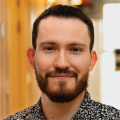
Daniel Bojar
Daniel Bojar is an associate professor in bioinformatics at the Wallenberg Centre for Molecular and Translational Medicine & the Department of Chemistry and Molecular Biology at the University of Gothenburg in Sweden, focusing on AI and data science in glycobiology. He obtained his PhD in mammalian synthetic biology at ETH Zurich and continued his postdoctoral training in computational biology at MIT & Harvard University. His group develops and applies methods to discover sequence-to-function associations and biological roles of glycans via a plethora of approaches. Daniel was awarded a Branco Weiss Fellowship - Society in Science, as well as an ERC Starting Grant, and was recognised as a "Rising Star" by the journal Advanced Science. He was also featured on the 2022 Forbes 30 Under 30 Europe list for work in Science & Healthcare.

Marcelo Calderon Calderon
Basque Center for Macromolecular Design and Engineering - POLYMAT
Marcelo Calderón is IKERBASQUE Research Professor and leader of the Responsive Polymers for Therapeutics Group at POLYMAT. His team develops polymer materials that sense environmental triggers and respond at the site of action as innovative therapeutic and diagnostic tools in biomedicine. Their materials have been applied in imaging, tumor ablation by hyperthermia, capture and quantification of circulating tumor cells (CTCs), wound healing, and dermal/mucosal drug delivery.
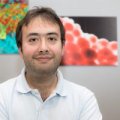
Gianni Ciofani
Gianni Ciofani (La Spezia, Italy, 1982) is a tenured Senior Researcher at the Istituto Italiano di Tecnologia (IIT), where he leads the Smart Bio-Interfaces Research Unit and coordinates the Center for Materials Interfaces. He previously served as Associate Professor at Politecnico di Torino and has been Visiting Professor at Waseda University (Japan) and the Pontifical Catholic University of Rio de Janeiro (Brazil). His research focuses on smart nanomaterials for nanomedicine, microphysiological systems, and biomedical research under altered gravity conditions. He has coordinated or participated in multiple competitive projects, including an ERC Starting Grant and three ERC Proof-of-Concept Grants, and has conducted four experimental campaigns aboard the International Space Station. Dr. Ciofani is the author of over 200 peer-reviewed publications (h-index 58), has delivered numerous invited lectures worldwide, and has been listed among the World’s Top 2% Scientists since 2020. He serves on editorial boards of leading journals and as reviewer for major international funding agencies.
June Ereño
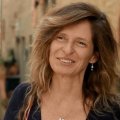
Isabella Felii
Isabella C. Felli is a Professor of Chemistry at the University of Florence (Università degli Studi di Firenze, Italy) and a leading researcher at CERM/CIRMMP, a European reference infrastructure for magnetic resonance. She is internationally recognized for her pioneering contributions to biomolecular NMR spectroscopy, particularly in the study of intrinsically disordered proteins (IDPs) and other complex or highly flexible systems that challenge traditional structural biology approaches. Her work focuses on developing innovative heteronuclear NMR methodologies, including advanced 13C-detection strategies that enhance sensitivity and resolution for proteins with low proton density or dynamic regions. These tools have provided new insights into conformational ensembles, disorder-to-order transitions, and transient interactions relevant to cell signaling and neurodegeneration. Prof. Felli has authored numerous high-impact publications, led international collaborations, and contributed to major European projects in magnetic resonance. Her research continues to expand the capabilities of NMR for characterizing challenging biomolecules with high biological and therapeutic relevance.
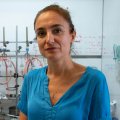
Vanesa Fernández Moreira
Vanesa Fernández-Moreira is a Tenured Scientist at the Instituto de Síntesis Química y Catálisis Homogénea (ISQCH, CSIC–Universidad de Zaragoza), where she leads a research line at the interface of inorganic chemistry, photophysics, and biomedicine. Her work focuses on the design and synthesis of coordination compounds and metal-based luminescent materials with applications in bioimaging, diagnostics, and photodynamic therapy. A central aspect of her research is the development of functional metal complexes—particularly based on transition metals such as iridium, ruthenium, and rhenium—that exhibit controlled photophysical behaviour and selective activity in biological environments. Her group explores how tuning ligand architecture and excited-state properties enables smart probes for live-cell imaging, targeted cancer therapy, oxygen sensing, and antimicrobial strategies. Dr. Fernández-Moreira has authored numerous scientific publications in leading chemistry and materials journals and participates in coordinated research projects combining synthetic chemistry, spectroscopy, and cellular biology. Her work exemplifies how molecular design and photochemical control can lead to next-generation diagnostic and therapeutic platforms.
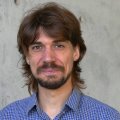
Marc Guell
Marc Güell is Professor at Pompeu Fabra University (MELIS-UPF), where he leads the Translational Synthetic Biology Laboratory. His research focuses on genome engineering and synthetic biology for therapeutic purposes, developing safer and more efficient gene-editing tools, engineered cells, and synthetic circuits aimed at treating human disease. He has a strong translational profile and is co-founder of several biotech companies: eGenesis (xenotransplantation and organ compatibility), sbiomedic (skin microbiome-based therapies), and Integra Therapeutics (advanced gene-editing platforms). His scientific work has generated multiple patents and more than 11,000 citations across areas such as gene therapy, regenerative medicine and microbiome engineering. Professor Güell has received distinctions including the National Research Award for Young Talent (2018), Highly Cited Researcher (Web of Science, 2019) and EMBO Young Investigator (2020). In 2024, he became a member of the Academia Joven de España. At UPF, he also teaches in Biomedical Engineering and coordinates the Master’s program in Biotechnology and Pharmaceutical Industry.

Silvia Hernández Ainsa
Instituto de Nanociencia y Materiales de Aragón, CSIC-Universidad de Zaragoza
Silvia Hernández-Ainsa is a Tenured Scientist at the Instituto de Nanociencia y Materiales de Aragón (INMA, CSIC–Universidad de Zaragoza), where she leads a research line in DNA nanotechnology and smart nanomaterials for biomedical applications. Her work focuses on designing DNA-based nanodevices, supramolecular assemblies, and hybrid nanostructures capable of controlled drug delivery, biosensing, and targeted therapeutic action. She has contributed to advancing DNA-origami engineering, responsive nanocarriers, and nanostructures that integrate biological, polymeric, and inorganic components. Her interdisciplinary approach brings together chemistry, materials science and molecular biology to develop precise molecular tools with diagnostic and therapeutic potential. Dr. Hernández-Ainsa has co-authored numerous peer-reviewed publications in top journals in chemical biology, nanomedicine, and supramolecular chemistry, and participates in national and European research projects. She is actively involved in mentoring early-career researchers and promoting interdisciplinary collaboration across nanoscience, biotechnology, and biomedical engineering.

Gonzalo Jiménez Osés
CIC bioGUNE
Gonzalo Jiménez-Osés received his PhD in Chemistry from the Universidad de La Rioja in 2007, working on asymmetric organic synthesis, then moved to Universidad de Zaragoza as a lecturer to work on metal catalysis, and then to University of California Los Angeles, to work with Ken Houk as a postdoctoral researcher on computational chemistry and enzyme design. He started his independent career as a Ramon y Cajal research fellow in 2015 back in University of La Rioja and joined CIC BioGUNE in 2019 as Principal Investigator of the Computational Chemistry Group. In September 2020 he was promoted to Ikerbasque Research Associate and in 2023 to Ikerbasque Research Professor. He is also a lecturer on metabolic chemistry in Deusto University. His research is highly collaborative and cross-disciplinary and uses multiscale computer simulations and wet lab validation to predict and understand complex chemical and biological processes, with special focus on protein design, bioorthogonal chemistry and molecular recognition.
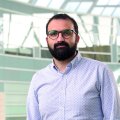
Fernando López Gallego
CIC biomaGUNE
Fernando López Gallego is IKERBASQUE Professor and leads the heterogeneous biocatalysis group (www.flg802.wixsite.com/flopezgallego) at the center for cooperative research in biomaterials (CIC biomaGUNE). Previously, he was ARAID researcher at the University of Zaragoza (2017-2019), junior IKERBASQUE researcher (2014-2017) at CIC biomaGUNE, junior technologist at REPSOL technology center (2013) and postdoctoral researcher at the University of Minnesota (2007-2010). He developed his predoctoral studies at the Institute of Catalysis and Petrochemistry (ICP-CSIC) (2002-2007) where he graduated as PhD in molecular biology from the Autonomous University of Madrid. His line of research consists in the development of biocatalysts based on enzymes supported on solid materials to develop new technologies in the field of sustainable chemistry and biomedicine.

Maria del Puerto Morales Herrero
ICMM/CSIC
María del Puerto Morales es investigadora científica del Instituto de Ciencia de Materiales de Madrid del Consejo Superior de Investigaciones Científicas (ICMM/CSIC) desde 2008. Sus actividades de investigación se centran en el área de la nanotecnología, en particular, en la síntesis y caracterización de nanopartículas magnéticas para aplicaciones biomédicas, tanto en diagnóstico como en terapia. Es autora de 7 capítulos de libros, 3 patentes, 200 artículos científicos con 8000 citas (h=45) y ha dirigido 3 tesis doctorales. Ha sido investigadora responsable del CSIC de dos proyectos de investigación europeos, uno para el desarrollo de nanopartículas para la detección y tratamiento del cáncer de mama y de páncreas (Multifun 2011-2015) y otro para el desarrollo de métodos de normalización y estandarización de nanopartículas magnéticas para aplicaciones biomédicas (NanoMag 2013-2017).
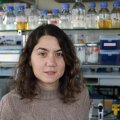
Paula Navarro
Paula Navarro is Assistant Professor in the Department of Fundamental Microbiology at the University of Lausanne (UNIL), Switzerland, where she leads research in structural cell biology and cryo-electron microscopy. She earned her Licentiate in Biology from the Complutense University of Madrid, an MSc in Molecular Biology and a PhD in Biophysics and Structural Biology from the Biozentrum, University of Basel. Following her doctoral studies, she conducted postdoctoral research at Harvard Medical School and has since developed an independent research program at UNIL focused on elucidating the molecular architecture of cellular components in situ. Dr. Navarro’s work employs cryo-electron tomography and advanced computational image processing to resolve 3D structures of biomolecules and cellular machinery in their native environments, providing insight into fundamental processes such as cell division and cell envelope organization. Her group’s research contributes to expanding the mechanistic understanding of biological systems at near-atomic resolution. She has secured competitive funding, including support from the Swiss National Science Foundation (SNSF), and has contributed to high-impact publications in structural biology.
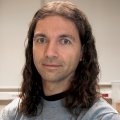
Carlos Romero Nieto
University of Castilla-La Mancha
Carlos Romero-Nieto is a Professor of Organic Chemistry at the Universidad de Castilla-La Mancha (UCLM, Spain), where he leads a research group focused on the design and synthesis of functional molecular and supramolecular systems with applications in sensing, bioimaging, and materials science. His work explores how rational molecular engineering and photophysical modulation can be used to create tailored optical and redox properties, enabling smart probes and responsive molecular devices. A significant part of his research focuses on phosphorus-containing organic molecules and their integration into multifunctional architectures, including fluorescent sensors, theragnostic platforms, and molecular logic systems. His group combines synthetic chemistry with spectroscopy, computational design, and biological testing to bridge molecular innovation and real-world applicability. Prof. Romero-Nieto has published extensively in high-impact journals and participates in national and international collaborative projects. His contributions demonstrate how molecular design can translate into advanced tools for diagnostics, catalysis, and next-generation functional materials.
María Luisa Romero Romero
How did life arise on Earth? This question lies at the heart of my research, from probing the stability of primordial proteins and the chemistry of early oceans to exploring how simple molecules evolved into self-organizing cells. My group combines chemistry, biophysics, and biology to understand how the flow of information from DNA to RNA to proteins underpins biological complexity. Using ancestral protein reconstruction and in vitro evolution, we decode molecular history to uncover the design rules that guided life’s emergence. These principles not only shed light on life’s origins but also enable the engineering of proteins with enhanced stability, activity, and novel functions for industrial, medical, and environmental applications.

Andreas Walther
Andreas Walther is a Professor for Macromolecular Materials and Systems at the Department of Chemistry at the Johannes Gutenberg University in Mainz (Germany), as well as a Max Planck Research Fellow at the MPI for Polymer Research. His research interests focus on developing life-like materials and systems that integrate dynamic processes and principles of chemical intelligence inspired by the basic principles of life. He was appointed to his present position in Mainz in 2020 with the prestigious support of the Gutenberg Research College. Andreas Walther is the recipient of an ERC Starting Grant and of an ERC Consolidator Grant. He was a co-founder of the DFG Cluster of Excellence on "Living, Adaptive and Energy-Autonomous Materials Systems" (livMatS).
Precios matrícula
La inscripción incluye bolsa de bienvenida, pausas de café, almuerzo y acceso completo a todas las sesiones científicas.
Opcionalmente, se puede añadir la cena de gala, que se celebrará el día 28 de abril a las 21:00 h. en la sagardotegi El Vaskito y tendrá un precio adicional de 50€.
Para acceder a la tarifa preferencial para miembros GEQB y estudiantes miembros GEQB, se debe estar al día en el pago de las cuotas.
| Matrícula | Hasta 15-03-2026 | Hasta 27-04-2026 |
|---|---|---|
| 250,00 EUR | 370,00 EUR | |
| 300,00 EUR | 420,00 EUR | |
| 230,00 EUR | 350,00 EUR | |
| 280,00 EUR | 400,00 EUR | |
| 420,00 EUR | 540,00 EUR |
Lugar
Aquarium
Plaza de Carlos Blasco Imaz 1, 20003 Donostia/San Sebastián
Gipuzkoa
Aquarium
Plaza de Carlos Blasco Imaz 1, 20003 Donostia/San Sebastián
Gipuzkoa
Objetivos de desarrollo sostenible
Desde UIK queremos aportar a la consecución de los Objetivos de Desarrollo Sostenible (ODS) 2030. Para ello, hemos identificado a qué objetivos contribuyen nuestros programas. Puedes consultar los objetivos a continuación.
La Agenda 2030 es la nueva agenda internacional de desarrollo que se aprobó en septiembre de 2015 en el seno de Naciones Unidas. Esta Agenda pretende ser un instrumento para la lucha a favor del desarrollo humano sostenible en todo el planeta, cuyos pilares fundamentales son la erradicación de la pobreza, la disminución de las vulnerabilidades y las desigualdades, y el fomento de la sostenibilidad. Es una oportunidad única para transformar el mundo antes del 2030 y garantizar los derechos humanos para todas las personas. Esta agenda marca 17 objetivos.
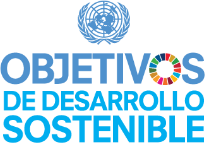
3 - Salud y bienestar
Garantizar una vida sana y promover el bienestar de todas las personas a todas las edades. Cuestiones clave: cobertura sanitaria universal, salud sexual y reproductiva, reducción de personas accidentadas por tráfico, polución y productos químicos, reducción tasa de mortalidad materna y neonatal, fin de epidemias como SIDA, combatir hepatitis y enfermedades transmitidas por el agua, prevención de drogas y alcohol, control tabaco.
Más información